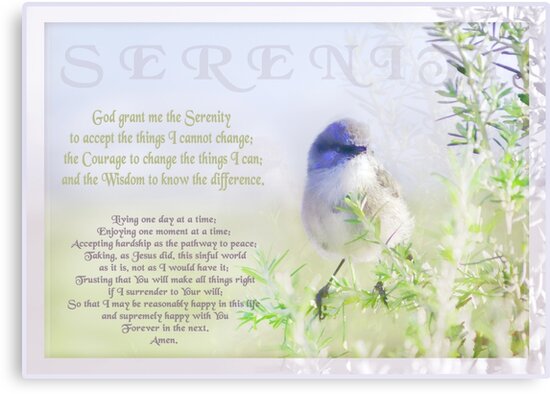

When we surrender to God's will, both in trusting that He is sovereign and in obeying Him, we can be "reasonably happy in this life." Of course, being "supremely happy with forever in the next " has everything to do with salvation. John 15:11 links obedience with fullness of joy in Christ. These passages also speak to our joy being in Christ, not in our circumstances. The understanding that hardship can lead to peace is a reflection of passages like James 1:2–4 and 1 Peter 1:3–9. It takes wisdom to discern anything at all, and true wisdom comes from God, not from man. James 1:5 encourages, " If any of you lacks wisdom, let him ask God, who gives generously to all without reproach, and it will be given him." First Corinthians 2:14–16 also affirms this. The "wisdom to distinguish" between that which we can and cannot change is a godly principle. In asking God to help us live a day at a time, we acknowledge that it is God who is in control, that He guides our steps and moves us along a path for His purpose and glory (Proverbs 20:24). For example, in asking God to help us accept that which we cannot change, we are acknowledging that God has placed us here under a given set of circumstances and that our life is meant to be lived for His glory (Acts 17:26–27 Colossians 3:23 1 Corinthians 10:31). The prayer itself incorporates several biblical principles. Living one day at a time, enjoying one moment at a time, accepting hardship as a pathway to peace, Taking, as Jesus did, this sinful world as it is, Not as I would have it, trusting that You will make all things right, If I surrender to Your will, so that I may be reasonably happy in this life, And supremely happy with You forever in the next.


It reads as follows: "God, give me grace to accept with serenity the things that cannot be changed, Courage to change the things which should be changed, and the Wisdom to distinguish the one from the other. The most common says, "God, grant me the serenity to accept the things I cannot change, the courage to change the things I can, and the wisdom to know the difference."Ī more complete and still-well-known version of the prayer was published in 1951. There are several variations on the prayer today. It is believed that the prayer itself came from Niebuhr's diary and was placed into newspaper articles in the 1930s, and later into a worship book sometime around 1940 by one of Niebuhr's students, Winnifred Crane Wygal. What we know as the Serenity Prayer is almost universally attributed to a man named Reinhold Niebuhr (1892-1971).


 0 kommentar(er)
0 kommentar(er)
